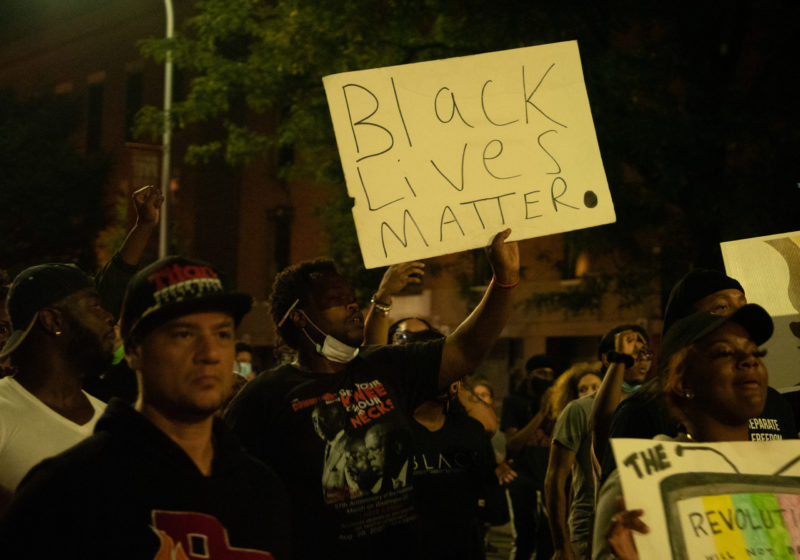In spite of the pouring rain last Sunday, students convened at the rear entrance of Rush Rhees Library, a week after the Africa is Bleeding protest, in support of the All Black Lives Matter demonstration hosted by the Douglass Leadership House (DLH) in collaboration with the Black Students’ Union and Pan-African Students Association.
“[There has been a] major disregard for Black lives in the U.S. and abroad,” DLH president and junior Sasha Murray said. Murray then led a moment of silence for lives taken by police brutality and dictatorships, and to honor Black lives lost due to COVID-19.
The goal of the demonstration, according to DLH vice-president and junior Andre Hodges, is to keep the conversations going and to continue “raising awareness about governments failing Black lives” in the United States, the African continent, and the Caribbean.
For junior Dennis Boateng, mass incarceration, which he likened to modern-day slavery, is one of the major problems, and he further stated that he’s tired of cycles.
“We’re tired but we’re still standing here fighting police brutality,” sophomore Epiphany Adams said while delivering a spoken word, highlighting that it’s 2020 and the fight for equality is still on.
Senior Ayobami Sanusi spoke on police brutality in Nigeria, stating that the Special Anti-Robbery Squad (SARS) has “done nothing but cause havoc in Nigeria,” targeting people with fancy gadgets and clothes. Sanusi also talked about how the “army shot peaceful protestors” in what is referred to as the Lekki massacre. “We all watched it on the Insta[gram] live.”
She pointed out that the government has not disbanded SARS — instead renaming it the Special Weapons and Tactics Unit (SWAT) — and called for more international involvement.
“They are responding to international pressure,” Sanusi said.
Several speeches focused on discrimination and marginalization endured by women.
“How many females are in positions of power?” Boateng said, calling out the lack of female representation in many African governments and calling the patriarchy “a disease.” Boateng said Frederick Douglass is a popular abolitionist, “but what about Anna Murray Douglass?” Boateng said her role, especially in helping Frederick Douglass escape from slavery, is not highlighted enough.
Junior Chernor Diallo said although his home country of Liberia had “the first woman to be democratically-elected as president of an African nation,” the nation still ranked “177th out of 188 countries in the Annual Gender Inequality Index.” Diallo said girls and women in his country are being exposed to high levels of violence.
Another speaker criticized the reported sterilization of immigrant women in a detention center by Immigration and Customs Enforcement (ICE). The speaker called this an act of “dehumanization of immigrants,” which is described by the “International Criminal Court as a genocide.”
While the unfavorable weather prevented the march from taking place, that did not deter demonstrators from chanting phrases like “End ICE,” “Black Trans Lives Matter,” “My Black Life Matters,” “Save Africa,” and “No Corruption.”
Murray recognized how the different struggles everyone is going through are tied together. According to Hodges, the demonstration was an “opportunity to bring all those stories together,” and also to promote unity and love in what he described as a troubling year and uncertain times.
For Diallo, witnessing how mounting pressure on the government elicited some reforms in his country is a testament to the power of advocacy and activism.
Senior Kamaldeen Raji echoed Diallo, agreeing that “we can actually make change if we work together.”
“I hope we will be able to keep up the energy and remain politically involved and apply pressure on our governments,” Raji said.
Diallo concluded by quoting cultural anthropologist Margaret Mead. “As we are gathered here today in relatively small numbers, in this rain, […] ‘Never doubt that a small group of thoughtful, committed, citizens can change the world.’”





